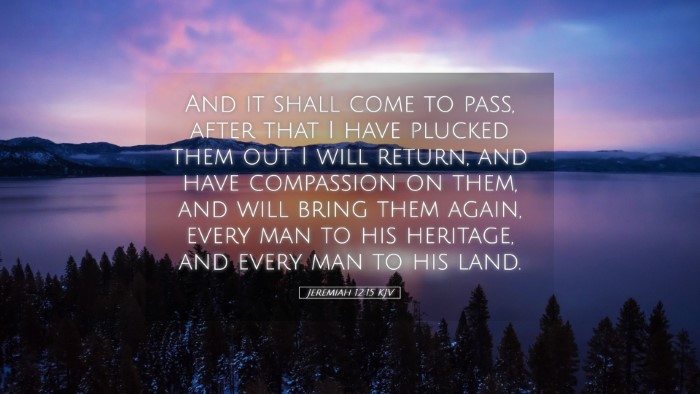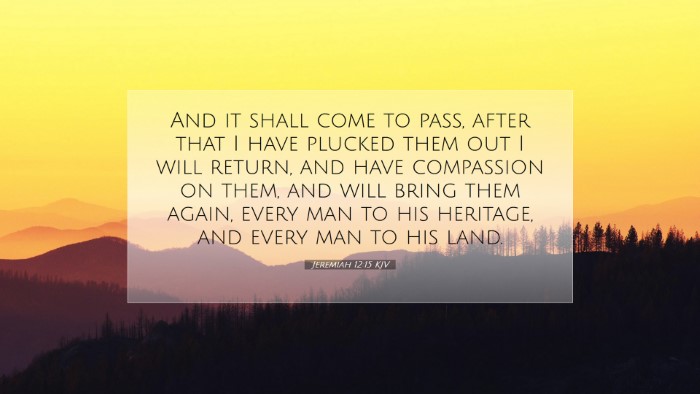Commentary on Jeremiah 12:15
Verse Text: "And it shall come to pass, after that I have plucked them out I will return, and have compassion on them, and will bring them again, every man to his heritage, and every man to his land."
Introduction
The verse Jeremiah 12:15 represents a turning point in the prophet’s message, encapsulating both divine judgment and restoration. This duality is essential for understanding the character of God as revealed in the Scriptures. In this commentary, insights from public domain sources such as Matthew Henry, Albert Barnes, and Adam Clarke are synthesized to illuminate the depth of this verse for pastors, students, theologians, and scholars.
Contextual Background
Jeremiah, known as the weeping prophet, delivered messages during a time of great turmoil in Israel. The context preceding this verse involves a plea from Jeremiah for understanding regarding the prosperity of the wicked and the suffering of the righteous. In paraphrasing Henry, the juxtaposition of divine discipline and mercy here shows that God, while just in punishment, is also compassionate and relational.
Analysis of Key Phrases
- “After that I have plucked them out”: This phrase refers to God's judgment and action against the unfaithful. Matthew Henry notes that the act of plucking out symbolizes the removal of those who persist in their ways of rebellion against God.
- “I will return”: This implies a shift from judgment to grace. Albert Barnes emphasizes that God’s return involves the reinstatement of His favor toward the faithful, which was a significant aspect of the covenant relationship.
- “Compassion”: The term denotes deep empathy and mercy. Adam Clarke elaborates on this, explaining how God's compassion is not merely emotional but leads to restorative action – a clear theme in the prophetic writings.
- “Heritage” and “land”: These words convey the idea of restoration and possessiveness. Barnes draws attention to the significance of returning to one’s rightful place, indicating that the Lord will ensure His people regain what was lost due to their unfaithfulness.
Theological Implications
This verse encapsulates a profound theological truth: the dynamic between God's justice and mercy. The plucking out signifies the resolve of God to address sin seriously, while the promise of compassion highlights the eternal willingness of God to redeem. This dual portrayal challenges the reader to grasp the holistic nature of God's character.
Application for Today’s Believers
For contemporary readers, Jeremiah 12:15 offers both a warning and a promise. Pastors may use this text to remind congregations about the seriousness of sin and the certainty of divine judgment. However, it is also an opportunity to proclaim the hope of restoration and a reminder that God's love prevails in the face of human failure.
- Believers are called to reflect on their own lives, examine areas of rebellion, and seek God’s redemptive work.
- This passage serves as a motivation for collective prayer for revival, emphasizing that God’s compassion is continuously available.
Conclusion
In summary, Jeremiah 12:15 paints a picture of a God who is actively involved in the affairs of humanity, balancing justice with compassion. The insights from Henry, Barnes, and Clarke enrich our understanding and invite us to appreciate the richness of God’s promises. As we chew on this verse, may we recognize the importance of responding to God’s leading, ensuring that we remain aligned with His will, suspended between justice and mercy.


